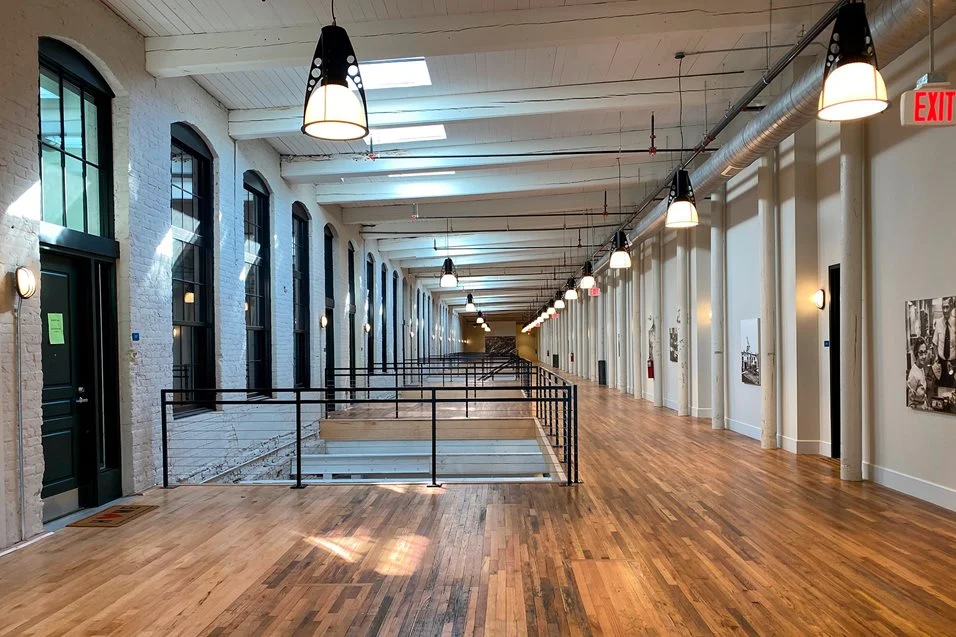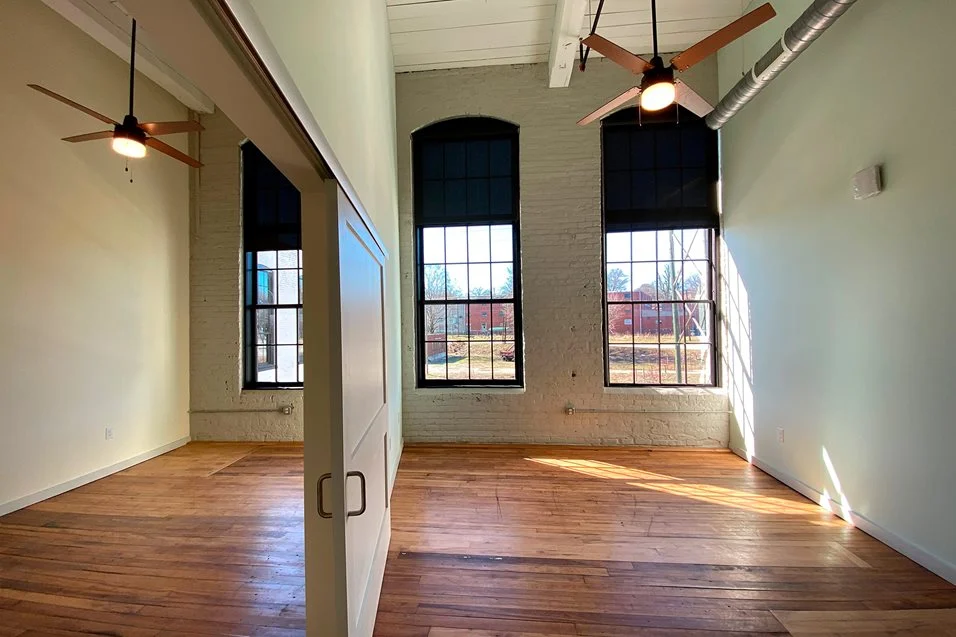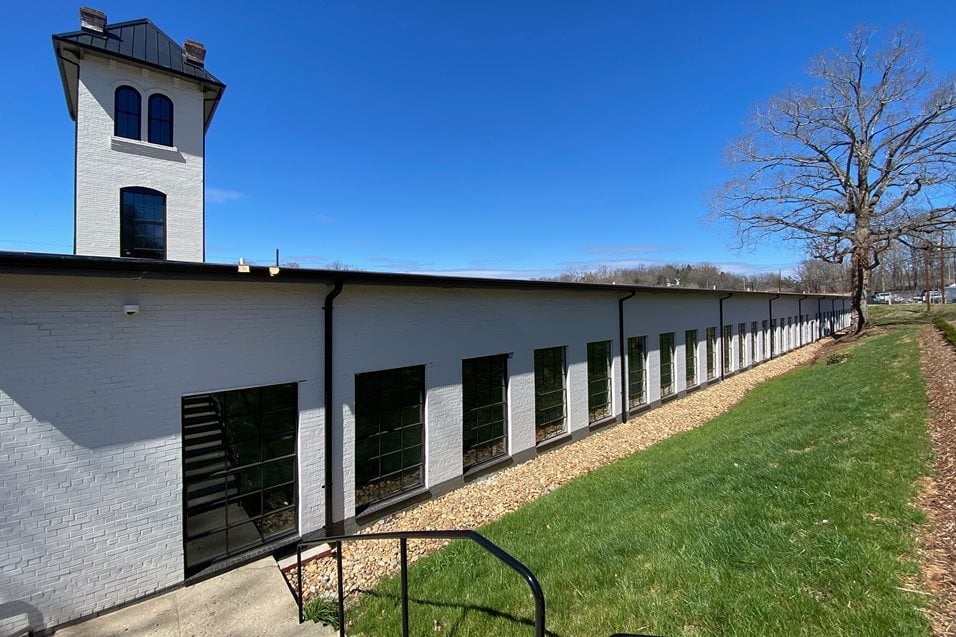DFI’s expertise helps turn a former mill into new apartments
In early 2018, the School of Government’s Development Finance Initiative received a call from the City of Lenoir, the county seat of Caldwell County in the foothills of the Blue Ridge Mountains. Private developers had approached the City with a proposal to renovate Lenoir’s historic Blue Bell textile mill into new apartments and condominiums and was seeking public involvement to make the development feasible. Faculty member Tyler Mulligan had provided phone-based advising to the developer and City at no charge on multiple occasions prior to that point, but now the project was reaching a critical stage, and the developer had refined the development concept. The City wanted to help but was unsure whether the developer’s proposal made financial sense. The developers recommended DFI be engaged by the City to evaluate the developer’s proposal, verify the developer’s assumptions, and make recommendations about financing tools.
Founded in 2011, DFI can be thought of as an extension of a local government’s planning, finance, economic, and community development departments. In the case of the Blue Bell Mill and the City of Lenoir, DFI provided a third-party review of the developer’s pro forma proposal to the City.
A living reminder of North Carolina’s manufacturing history
The Lenoir Cotton – Blue Bell Mill was built near downtown Lenoir in 1902 and was renovated significantly during the 1950s.
Lenoir Cotton Mill built the original structure in 1902 and expanded it 18 months later, doubling its capacity. It was the largest of Caldwell County’s seven textile manufacturers through the early 1920s and employed about 200 people until its owners sold it to members of the Bernhardt family, who owned Bernhardt Furniture Company, in 1939.
Although the Bernhardt family owned it until 2007, they leased it for decades in the mid-20th century to Blue Bell Inc., a Greensboro-headquartered work clothes manufacturer. Blue Bell used the Lenoir mill as a satellite plant to fulfill contracts for military apparel and the retail market. By October 1952, 400 employees—most of them women—could generate as many as 84,000 pairs of pants each week, primarily women’s and girls’ sportswear. Blue Bell remained open until 1983. After it left, the building had various uses, including storing furniture for Bernhardt Furniture Co.

A view of interior hallway of Blue Bell at Lenoir Mills. Courtesy of Blue Bell at Lenoir Mills.
Bringing parties together
After the City of Lenoir approached DFI in early 2018, at the recommendation of developers Yorke Lawson and Tom Niemann, DFI reviewed Lawson and Niemann’s proposal. The developers were wrestling with a $2.25 million “gap” in the financing required to renovate and restore the Blue Bell Mill, converting it into market-rate apartment and condominium units. Both parties were aware that North Carolina cities are legally prevented from giving incentives for market-rate housing.
Working on behalf of the City, DFI evaluated Lawson and Niemann’s proposal and conducted its own independent review. DFI met with the developers, examined all their plans and budget assumptions for the project, and toured the 3.9-acre site.
“DFI generated valuable insights into the developer’s assumptions, and ideas for amending it—including justification for increasing the value of available tax credits for historic redevelopment and raising market rent assumptions,” said Rory Dowling, DFI Development Adviser. Lawson and Niemann accepted two of DFI’s recommendations, which reduced the financing gap. Working within its legal authority, the City agreed to invest in public facilities adjacent to the project, such as parking lots and water- and sewer-line extensions.
“Through working with the developer and the City, we were able to get both parties comfortable with a plan they both agreed to,” Dowling said.
With both parties on board, construction began. After some delays due to the COVID-19 pandemic, Blue Bell at Lenoir Mills opened in 2021. The one-time factory now houses 46 loft-style apartments, and its masonry façade, timber-intensive interior, large wooden columns, and arched 12-foot-tall windows have all been preserved.
Joe Gibbons, the mayor of Lenoir, said the city is pleased with the outcome. “We preserved a great building that was a part of our history,” he said. Lenoir had great need for market-rate housing, and Blue Bell’s 46 units provide that. Plus, the 100 or so people who live at Blue Bell are now part of the economic life of Lenoir’s downtown. “It brought more people into the community to live in our downtown region. It was a win-win for us.”
Gibbons said Blue Bell was the first part of a three-piece campus that is bringing new life to the west end of Lenoir. Next to be renovated is the Steele Cotton Mill, another former textile mill that will also have market-rate housing, and an old freight station that will become a restaurant.
“By DFI doing what they did, and the developers doing what they did, it showed what can happen, and people will come to this area,” he said. “It’s changing that side of Lenoir. And that's what we’re really excited about—to see that keep going.”
Dowling said the Blue Bell project is a great case study of DFI’s capabilities and service to local communities in North Carolina.
“It shows that that we provide a benefit to both the public and the private sector,” Dowling said. “Both parties saw the value in bringing in DFI. They really didn't know how to proceed. DFI was created to break down those barriers and to educate both sides on how to get these projects to the finish line. It was also a great example of proving that these projects can be successful in smaller communities like Lenoir where there's not a precedent of large-scale investment. This project proved that bringing this many units to a small community and an older building could be successful. It’s a great case study for other communities similar to Lenoir, who might be struggling to attract private development for these types of buildings in and around their downtowns.”

A view of an apartment at Blue Bell at Lenoir Mills. Courtesy of Blue Bell at Lenoir Mills.
Published June 20, 2023



